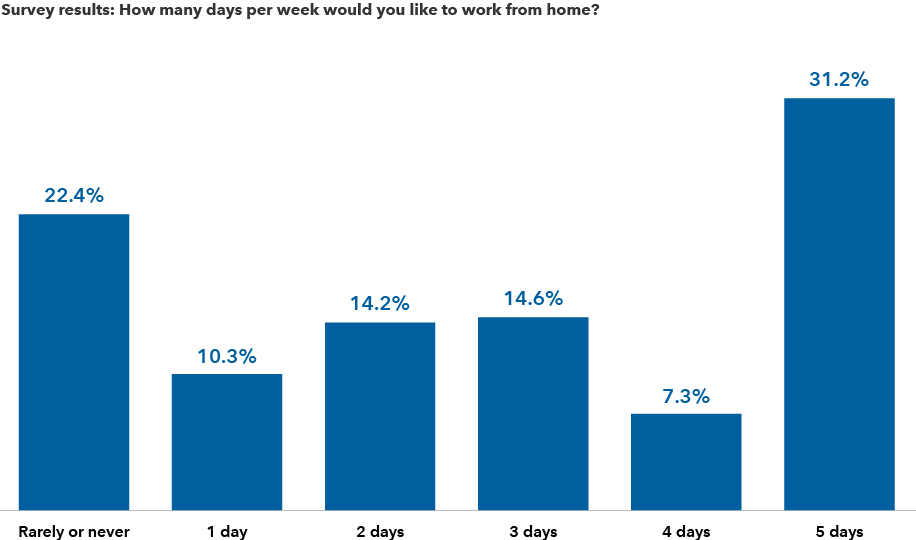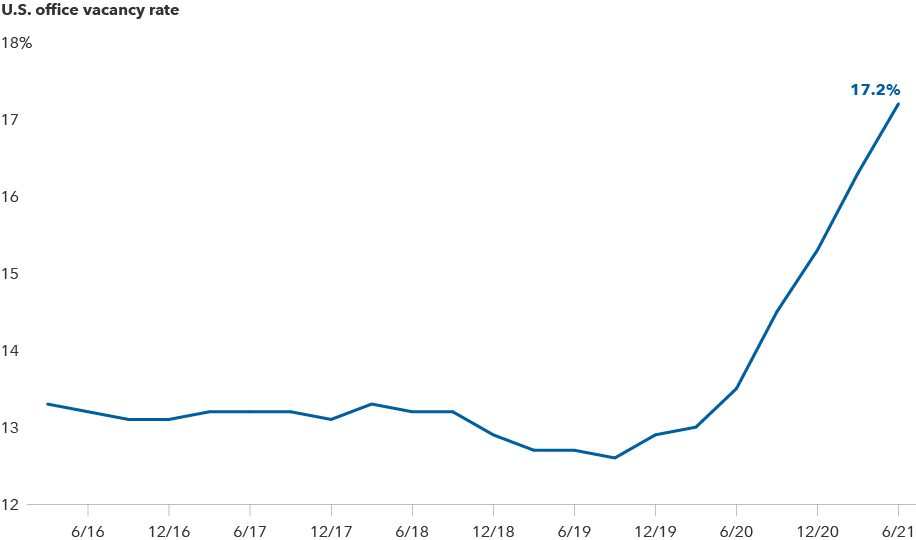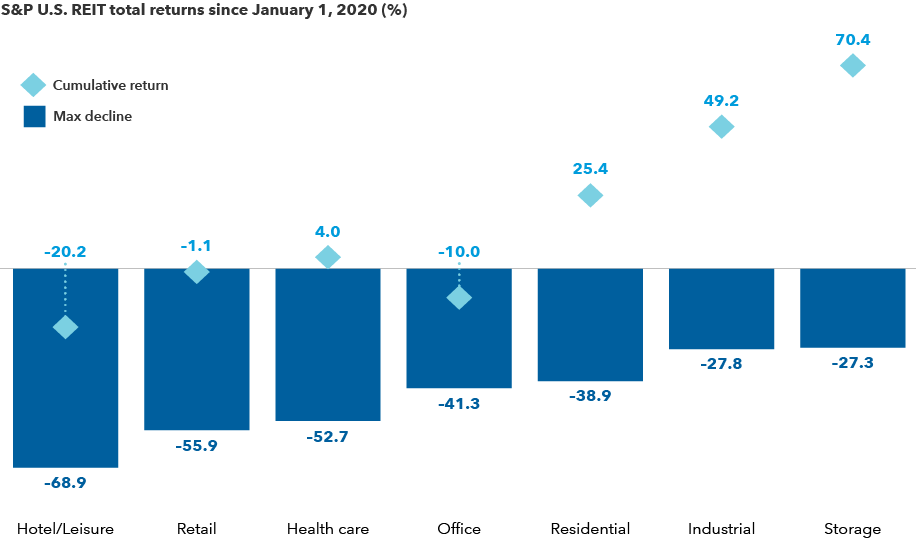Market Volatility
Demographics & Culture
You might think where you buy your coffee in the morning doesn’t amount to a hill of beans when it comes to the health of the U.S. economy. But, in fact, it could mean a great deal in the years ahead.
“Working remotely for the past year and a half, I’ve been buying coffee closer to home instead of my usual downtown coffee shop,” says Capital Group economist Jared Franz. “In my case, it doesn’t mean much, but if a quarter of the U.S. labour force does it one or two days a week, it has significant implications for the economy, financial markets and the future of large cities.”
While the data is short term and the jury is still out, there are early signs of a powerful deurbanization trend in the United States and other major developed economies. Since the start of the COVID-19 pandemic, migration from some big cities has accelerated while suburban home prices have soared. Moreover, national labour force surveys indicate an overwhelming majority of employees who have been working from home want to continue doing so one or more days per week.
Moving out: 2020 urban exodus

Sources: U.S. Department of Commerce, Visa Business and Economic Insights. Net migration includes movers from abroad. As of December 31, 2020.
By 2022, Franz estimates, roughly 25% of U.S. employees could be working remotely — up from just 5% prior to the pandemic — and many of them will choose to live in less expensive, less crowded areas. Assuming this shift persists, it would be the biggest change in labour force patterns since World War II.
“From an investment perspective, we need to determine how durable these changes are, how they could affect consumer spending patterns and how companies may respond,” Franz explains. “For instance, what happens to that downtown coffee shop? Or the restaurants that serve the same area? Or the office space that is no longer needed?”
“I don’t think we are talking about the death of big cities, by any means,” Franz stresses. “But I do think we may have reached peak density for urban centers such as Chicago, Los Angeles, New York and San Francisco. They will have to adapt to a world where much of the labour force is no longer coming into an office every day. Twenty-five percent may not sound like much, but it’s a huge change from 5%.”
Many important questions remain unanswered: Will people flock back to big cities after the pandemic is over? Will they prefer life in the suburbs and other outlying areas? Or will both happen at the same time — perhaps with younger employees preferring to live in vibrant, dynamic cities and older workers continuing to fuel the growth of the suburbs and exurbs?
One crucial question appears to be resolved: People like working from home.
Want to work from home? Yes please!

Source: National Bureau of Economic Research working paper, “Why working from home will stick.” Based on surveys of 33,250 respondents conducted from May 2020 through March 2021. Results include all respondents who said they can work from home at least part of the time and those who reported mainly working from home at some point during the COVID-19 pandemic, which was 64% of the full sample.
Surveys by the National Bureau of Economic Research show that employees who are able to work from home definitely want to continue doing so. More than 77% said they would like to work remotely at least one day per week and 31% said they would prefer all five days. Not every job can be done remotely, of course, but 64% of respondents said their jobs are conducive to working from home at least part of the time.
It’s important to note that not everyone is on board with the work-from-home phenomenon. There has been a quiet backlash in recent months from certain companies pushing for more traditional work schedules, as well as the possibility of lowering the pay of employees who move from high-cost cities to lower cost areas. Companies don’t appear to be gaining much traction on those issues at the moment.
One large investment bank recently posed the question of whether we have reached the end of the honeymoon phase of remote work, citing concerns about employees’ isolation and mental health, the loss of company culture, the fate of downtown businesses and the growing threat of cyber attacks.
Sectors that benefit from deurbanization
Many sectors stand to benefit if the deurbanization trend endures, including personal travel and leisure, technology and communications, cloud computing, and the home improvement industry and residential real estate — particularly in the suburbs and other outlying areas.
Changes in consumer behaviour mean these trends could be durable even as we head back to the office several days a week. For example, stores such as The Home Depot and Lowe’s have clearly benefited from more people buying new and existing homes in the suburbs while the shift toward home fitness has boosted companies such as Peloton and Nike.
Exercise and outdoor activities are a potential bright spot, says Capital Group portfolio manager Lisa Thompson. “As an investment theme, I think it’s almost metaphoric. People are spending more time in nature, hiking or riding bikes, and they are realizing it’s actually very nice to be outdoors, to spend more time with family, to visit the national parks. I have friends who go camping now I never imagined would go camping.”
Sectors that suffer from deurbanization
On the flip side, commercial real estate stands out as one of the hardest hit sectors, and the outlook remains challenging to say the least. U.S. office vacancy rates nationally rose above 17% in the second quarter of 2021, up from roughly 13% in the first quarter of 2020 before government-imposed lockdowns brought the economy to a virtual standstill.
Commercial real estate has been hit hard

Source: Cushman & Wakefield. As of June 30, 2021.
Commercial real estate loans in the U.S., meanwhile, have not experienced the type of distress or outright defaults that investors might expect, largely due to U.S. government stimulus programs that helped small and mid-size companies meet their lease and payroll obligations. “We’re in a holding pattern right now because government support has been so strong,” Franz notes, “but as we move into 2022, I think that could change materially for the worse.”
Within the wider real estate industry there has been a large disparity between subsectors that have been hammered — office, retail and hotel, for instance — and others that have rallied as the economy and stock markets recovered from the downturn. Those include storage, industrial and residential categories.
A tale of two real estate markets

Sources: Refinitiv Datastream, Standard & Poor's. As of 9/10/2021. Represents total returns in USD of subsectors within the S&P U.S. REIT Index.
In U.S. cities with large urban centers, state and local government finances could also be impacted, Thompson adds.
“Deurbanization puts a lot of pressure on states like New York and California that have relied on a very high tax base of wealthy people in Manhattan, Los Angeles and San Francisco,” Thompson notes. “It could wind up being a big challenge for states that have benefited enormously from the mega-city concept.”
Echoing Franz’s sentiment, however, Thompson says she expects large urban centers to adapt and eventually thrive in a post-COVID environment. Big cities are resilient, she says, and they have a long history of recovering from difficult times.
“I can remember when big cities were not places that people wanted to go in the 1970s and 1980s,” Thompson recalls. “Today, older people may say, ‘I don’t need to be in the city anymore,’ but I think younger people will still want to be at the center of civic life and entertainment. Cities will just reinvent themselves again.”
Our latest insights
-
-
Market Volatility
-
Markets & Economy
-
-
Market Volatility
RELATED INSIGHTS
-
Demographics & Culture
-
Market Volatility
-
Global Equities
Commissions, trailing commissions, management fees and expenses all may be associated with investments in investment funds. Please read the prospectus before investing. Investment funds are not guaranteed or covered by the Canada Deposit Insurance Corporation or by any other government deposit insurer. For investment funds other than money market funds, their values change frequently. For money market funds, there can be no assurances that the fund will be able to maintain its net asset value per security at a constant amount or that the full amount of your investment in the fund will be returned to you. Past performance may not be repeated.
Unless otherwise indicated, the investment professionals featured do not manage Capital Group‘s Canadian investment funds.
References to particular companies or securities, if any, are included for informational or illustrative purposes only and should not be considered as an endorsement by Capital Group. Views expressed regarding a particular company, security, industry or market sector should not be considered an indication of trading intent of any investment funds or current holdings of any investment funds. These views should not be considered as investment advice nor should they be considered a recommendation to buy or sell.
Statements attributed to an individual represent the opinions of that individual as of the date published and do not necessarily reflect the opinions of Capital Group or its affiliates. This information is intended to highlight issues and not be comprehensive or to provide advice. For informational purposes only; not intended to provide tax, legal or financial advice. Capital Group funds are available in Canada through registered dealers. For more information, please consult your financial and tax advisors for your individual situation.
Forward-looking statements are not guarantees of future performance, and actual events and results could differ materially from those expressed or implied in any forward-looking statements made herein. We encourage you to consider these and other factors carefully before making any investment decisions and we urge you to avoid placing undue reliance on forward-looking statements.
The S&P 500 Composite Index (“Index”) is a product of S&P Dow Jones Indices LLC and/or its affiliates and has been licensed for use by Capital Group. Copyright © 2025 S&P Dow Jones Indices LLC, a division of S&P Global, and/or its affiliates. All rights reserved. Redistribution or reproduction in whole or in part are prohibited without written permission of S&P Dow Jones Indices LLC.
FTSE source: London Stock Exchange Group plc and its group undertakings (collectively, the "LSE Group"). © LSE Group 2025. FTSE Russell is a trading name of certain of the LSE Group companies. "FTSE®" is a trade mark of the relevant LSE Group companies and is used by any other LSE Group company under licence. All rights in the FTSE Russell indices or data vest in the relevant LSE Group company which owns the index or the data. Neither LSE Group nor its licensors accept any liability for any errors or omissions in the indices or data and no party may rely on any indices or data contained in this communication. No further distribution of data from the LSE Group is permitted without the relevant LSE Group company's express written consent. The LSE Group does not promote, sponsor or endorse the content of this communication. The index is unmanaged and cannot be invested in directly.
BLOOMBERG® is a trademark and service mark of Bloomberg Finance L.P. and its affiliates (collectively “Bloomberg”). Bloomberg or Bloomberg’s licensors own all proprietary rights in the Bloomberg Indices. Neither Bloomberg nor Bloomberg’s licensors approves or endorses this material, or guarantees the accuracy or completeness of any information herein, or makes any warranty, express or implied, as to the results to be obtained therefrom and, to the maximum extent allowed by law, neither shall have any liability or responsibility for injury or damages arising in connection therewith.
MSCI does not approve, review or produce reports published on this site, makes no express or implied warranties or representations and is not liable whatsoever for any data represented. You may not redistribute MSCI data or use it as a basis for other indices or investment products.
Capital believes the software and information from FactSet to be reliable. However, Capital cannot be responsible for inaccuracies, incomplete information or updating of the information furnished by FactSet. The information provided in this report is meant to give you an approximate account of the fund/manager's characteristics for the specified date. This information is not indicative of future Capital investment decisions and is not used as part of our investment decision-making process.
Indices are unmanaged and cannot be invested in directly. Returns represent past performance, are not a guarantee of future performance, and are not indicative of any specific investment.
All Capital Group trademarks are owned by The Capital Group Companies, Inc. or an affiliated company in Canada, the U.S. and other countries. All other company names mentioned are the property of their respective companies.
Capital Group funds are offered in Canada by Capital International Asset Management (Canada), Inc., part of Capital Group, a global investment management firm originating in Los Angeles, California in 1931. Capital Group manages equity assets through three investment groups. These groups make investment and proxy voting decisions independently. Fixed income investment professionals provide fixed income research and investment management across the Capital organization; however, for securities with equity characteristics, they act solely on behalf of one of the three equity investment groups.
The Capital Group funds offered on this website are available only to Canadian residents.
 Jared Franz
Jared Franz
 Lisa Thompson
Lisa Thompson